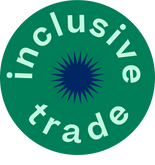Inclusive Trade Modern Slavery statement
This statement focuses specifically on what we do at Inclusive Trade to identify and prevent modern slavery within our own operations and supply chains.
Section 54 of the Modern Slavery Act (Transparency in Supply Chains) requires certain commercial organisations to publish an annual modern slavery statement.
For us, simply stating that we do not tolerate modern slavery is not sufficient, we actively engage with brands that sell on our platform to create transparency across the supply chain and aim to ensure modern slavery is not present in any of their products.
A key mission of Inclusive Trade is to provide a platform for responsible brands that leaves no room for the occurance of modern slavery in supply chains. We require transparency and traceability from the suppliers we onboard so that they can assure us that the labour conditions of the workers involved in their supply chains is fair and just. We seek to achieve this by engaging the following actions:
- We require from all brands that would like to work with us, to complete our initial assessment tool where they disclose information on sourcing and labour relations in their supply chain. This form acts as an initial screening and showcases our zero-tolerance policy for modern slavery.
- We require from brands, their story, sourcing of products and ethical product development which we can share with our customers. Not only does this build consumer trust, but also informs consumers on how they can leverage their spending power to promote ethical business practices to realise the eradication of modern slavery in supply chains.
- We understand that global supply chains have become fragmented and complex, and that complete oversight can be difficult to achieve for some brands. However this is a top priority for us and we ask brands who do not have all the information to actively engage with their supply chains to gather information on accreditations, certifications or other forms of information to validate their claim of ethical production. We share with brands our deep and extensive knowledge of the industry through our founder and our advisory team and advise them on how to request and document information even when working with artisans, home workers and cooperatives when assessing their suppliers. As a result this helps create a greater impact across all supply chains of all our suppliers.
- We embark on a journey of continuous improvement with our partners using our Shop by impact ® model. We have developed a bespoke self-impact assessment tool that asks our brands to evaluate their business model against the three SDGs that are at the core to Inclusive Trade´s ethos; SDG 5 Gender Equality, SDG12 Responsible Consumption & Production, SDG 13 Climate Action. Furthermore, we encourage brands to list accreditations they currently hold or are working towards in the self-impact assessment form. They are then encouraged to update us with new data or information they have about their sourcing and production practises.
We are proud to partner with brands that are as committed to eradicating forced labor, modern slavery and human trafficking from the industry as we are. At Inclusive Trade, we will continue to challenge industry standards and push for completely traceable and transparent supply chains.
